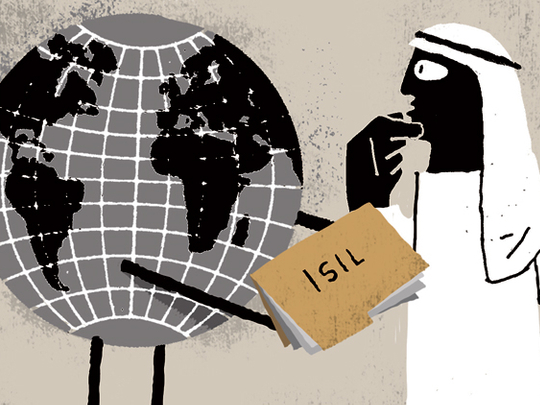
In the end, it was clear from events unfolding in the Middle East that the burden of fighting terror in the region would mainly fall, financially and probably militarily, on the shoulders of the GCC countries.
The six Arab Gulf states were among those present at the summit held in Jeddah on September 11 to adopt new measures to combat the Islamic State of Iraq and the Levant (Isil) and other terrorist groups in the region. Ten nations came together, led by the 11th, the United States.
The other four countries present signed the final declaration of the meeting in Jeddah, but some of them have very little to offer in this particular fight.
Lebanon is the least able to help, itself being torn between different political factions. Hezbollah, one of the important pillars of the Lebanese government, is itself branded by some sections of the international community as a terrorist organisation. Lebanon is a state that has been without a president for months now, with no hope of getting one in the near future.
Egypt is busy fighting terror on its own soil, and is occupied with the events in Libya on its western border, where a new phase of civil war is unfolding. The fighting there threatens to spill over into Egypt. At its southern border, Egypt has unresolved differences with Sudan. And it has Hamas in Gaza at its eastern flank. Add to all this the fact that it is facing economic and social challenges. Besides, it is official Egyptian policy not to intervene in the problems of other countries in the region. So Egypt cannot offer a lot in this new confrontation.
Iraqi bickering
Iraq has the biggest stake in fighting Isil, which is spreading terror on its soil, killing its people, and occupying its land. But the bickering amongst the political elite of the country prevents a full-scale use of military power. The collapse in June of a large section of the Iraqi army in front of the advancing Isil militants made a bad situation worse. The Kurds, who have the only reliable “boots on the ground”, want to gain the most from this situation. They have warned the new Iraqi government that if their demands regarding land and oil revenues are not met in three months, they will pull out from the new government.
Jordan, with its few resources, can only offer training and some logistical help but no more than that. Turkey pulled out of the deal altogether, with its prevailing problems with other states in the region. It also differs on the definition of terrorism itself. Europe is also a reluctant part-timer.
US President Barack Obama’s ‘New Strategy’ is too little, too late. Washington is still saying publicly that the countries of the region have to take the initiative themselves. Damascus will raise objections to the bombing of Isil targets in Syria; so will Iran and Russia, for different reasons. The Syrian regime will use the opportunity to gain global respectability and be recognised as a major player in the region’s fight against terrorism.
It’s a golden opportunity for the regime leaders to be pardoned by the international community for all the atrocities they have committed so far against the Syrian people. The Iranians are looking for ways and means to gain more benefits from the West for their nuclear programme, and to lift the sanctions. Iran has suffered for a long time. Tehran wants to be recognised as a major player.
The Russians would like to see the US in a political dilemma, in order to gain ground on the other front, namely Ukraine. So what we are witnessing is a grand “international blackmail” against the region.
GCC countries will be forced to pay the huge cost of dealing with this acute crisis. Its widely recognised by experts that unless there are “boots on the ground”, nothing can be achieved. Air strikes can achieve very little, terrorists can build tunnels to go underground and take cover in towns and villages and come out at the time of their choosing. Helping moderate forces in Iraq and Syria demands a grand strategy, involving intelligence on the ground. Iraq in particular needs this. It also has to bring on board its Sunni community. But this will require great political effort.
It looks like the GCC will be the grand player in the complicated Middle East politics in the years to come. Saudi Foreign Minister Saud Al Faisal said at the Jeddah meeting that his country will take all the necessary steps needed to pave the way for the declaration to be successful. This bold stance needs the support of the other GCC members to succeed. It requires a lot of thought, loads of money, and lots of resolve.
Mohammad AlRumaihi is a professor of political sociology at Kuwait University. You can follow him on Twitter at www.twitter.com/@rumaihi42









